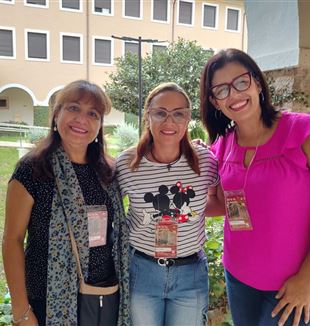
Venezuela: Charitable work in class
In a country torn apart by poverty and violence, even the school system is collapsing. So Jenny and friends in El Tocuyo are doing charitable work by supporting children's education. "Building peace also comes through sharing needs."There is a very popular Latin American song called Samba Landó, whose refrain says, "¿Qué tienes tú que no tenga yo? ". What do you have that I do not have? These words, originally sung to condemn supporters of slavery, could be addressed to each of us today. "Individualism is something that kills more than poverty or political crises. But, if I look at the experience I live, it is still possible to discover the value of communion and charity, to identify with the need of the other." Lila comes from Venezuela, a violent and fragile country. She met the movement in Merida, her city in the Andes, where she does charitable work with some friends in a retirement home. And she does this, she says, "to be continually educated in gratuitousness." Jenny, on the other hand, lives in El Tocuyo, a small Venezuelan town that is among the oldest in the country: "Before the pandemic, our community did charitable work in the parish of San Francisco. We prepared the so-called 'solidarity pot' and then distributed the food to about a thousand people affected by the economic and social crisis. Covid changed everything, however, because we could no longer go into homes to bring food. So, partly out of distraction, partly because of the difficulty of the situation, we did not continue." For some time they continued to cook for the elderly, and some good-hearted volunteers from the parish were able to deliver food to their homes, until at some point "no one prepared the 'solidarity pot' anymore, and our community stopped doing charitable work."
But Jenny and her friends were left with a sting, a lack of that free, community gesture. There were many reasons not to continue: the cost of gasoline has increased drastically across the country, safety on the streets has become optional, everywhere you look there are emergencies. Hospitals are collapsing because they lack staff and medicine, schools are closing due to teacher shortages while unemployment, inflation and mass emigration are now out of control. Everyday life is exhausting: pasta and rice are hard to find; with the average salary, meat is a luxury, let alone paying for medical care or school fees.
"It is no surprise that many think only of themselves. There is a strong temptation," Jenny continues, "But this happened to me and my friends: at the Assembly of CL leaders in our country, we spoke about being nostalgic for charitable work, and the more we talked about it, the more it emerged that this gesture must start from our need. We took that question seriously: what need do we have? It was a provocation! Our gaze became more attentive, until earlier this year, seeing the crisis in the schools – children are receiving classes once or twice a week because teachers are making less than $20 a month and are no longer going to work – we thought we should look there. Our community is mostly made up of educators and teachers…we jumped into action. One of us works in a school in El Tocuyo, where there is a high dropout rate, due to poverty and the absence of teachers, and where a storm partly ruined the building. We said, let us start from there."
So they proposed to the whole local community to support education in that area, and there was a positive response. "We went to the leaders of the area, the government representatives, to present this desire to teach the children of the area. They immediately supported us. We do charitable work every fortnight, trying to prepare the lessons in a playful and creative way. The first meeting with the children was special because it was the feast day of Our Lady of Lourdes, patroness of the Chapel that houses us while we wait for the school to be ready for use again. I remember that to go to El Molino that day we borrowed a car. On the way back there were nine of us and we all had to fit in – one on top of the other. I do not have a car right now, so someone always lends us a car to go to charitable work. We use our own money to pay for gas; we either organize a collection among ourselves or we use the common fund.
Read also - The care for life: I don't detach
Why do we do it? Because going there, having resumed charitable work, gave us back the joy of being of service to others. We were moved by the tough circumstances that some of the children experience, but we can recognize the face of Christ coming to meet us in their faces." Building peace also comes through sharing needs. That also helps rebuild a social fabric torn by violence and crisis.